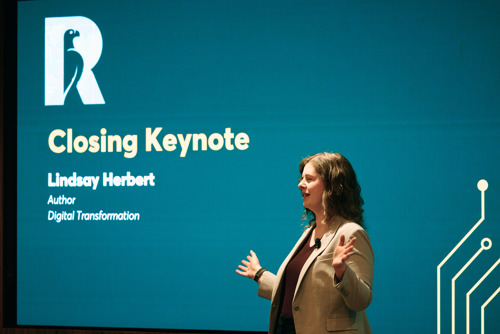What makes us human? What really matters? How do we measure what matters? According to Lindsay Herbert, it is good that things have gotten worse in the recent past. It has made big and scary corporates rethink and reconceptualise their metrics from profit-making to things that really matter – the ‘black bears’ of the world.
Delivering the Closing Keynote for the day at the Rhodes Forum for Technology and Society 2025, Lindsay remarked that the current state of the world, no matter how bleak, has led to a paradigm shift in how big corporates think about metrics that matter. Big and scary corporates are moving beyond a solely profit-seeking model and trying to incorporate more sustainable metrics based on collaborative approaches and conversations with customers. These conversations which require active and radical listening have not just transformed how companies approach pressing challenges of humanity but also made them more profitable and sustainable in turn.

When the CEO of Ecolab Inc. spoke to his customers, he realised that the one thing everyone cared about the most was access to clean water. More than any technical aspects of his products, people across the world wanted access to clean drinking water. He took this feedback back to Ecolab and started to leverage technological resources to improve access to clean water. Within a few years, his company was able to ensure access to clean water during Covid-19 on a large scale and provided innovative solutions for water management. The company is now at the forefront of providing services to artificial intelligence (AI) data centres for chip cooling to help reduce environmental degradation by AI. The metrics of ‘access to clean water’, ‘wastewater management’, etc., not only addressed a global challenge, but also transformed Ecolab into a more sustainable profit-making venture.
Boehringer Ingelheim, a leading pharmaceutical company, did a similar thing – instead of focusing solely on developing a vaccine for swine flu, they focused on its early detection and prevention in large scale pig farms. While doing the latter, they were able to identify symptoms and patterns of the disease which eventually made it much easier to develop the vaccine. They focused on using emerging technology, particularly AI, for such detection in individual pigs in large farms. By refocusing their approach towards healthcare and sustainability, they were eventually able to make the company more profitable as well. The newly appointed CEO of DBS Bank, Singapore was able to bring back a dying company by making consumer welfare the primary metric for the bank. By focusing on how to save consumers’ time, the bank became the first in the country to introduce cryptocurrency and deploy AI on a large scale. A company that was once infamous for being slow and taking twenty-seven days to process a credit card request was now a national leader in financial technology. The road to this was simple: take a step back and listen to what consumers want and what matters to them.
‘We will not be measured by whom we exclude but whom we include’, was the motto for President of Arizona State University, whose metric was access to quality education. Through multiple collaborations with different institutions across the world, he was able to provide access to quality education to areas previously deprived of it. He did not stop here. To ensure that he addresses the problems of his own students who were in huge amounts of debt, he hired them to teach on and facilitate the international programmes.
According to Lindsay, these examples teach us the value of choosing metrics that matter, and identifying such metrics can help us ‘get ourselves together, co-design, and co-create’. These metrics help corporates to move beyond individualistic and profit-making thinking into more community-driven and collaborative approaches which enable sustainable practices to solve the biggest challenges faced by humanity, like access to water and education.
She referred to metrics that matter as ‘black bears’ – they are out in the wild harming other people, and often difficult to spot in a room. While we are busy addressing the elephant in the room, the black bear is out there causing widespread problems. It is therefore up to us to move beyond the elephant in the room to find and tackle the black bears of our time.
